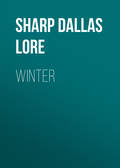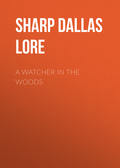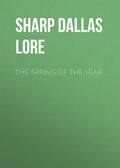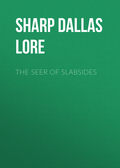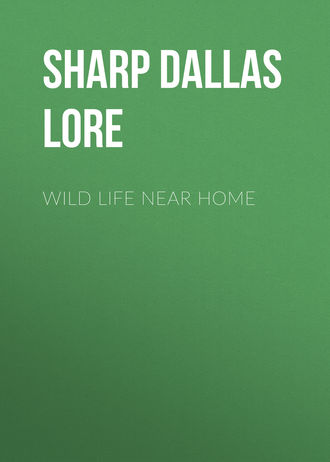
Sharp Dallas Lore
Wild Life Near Home
I began to climb. With this the bird lapsed into the quiet of despair, perched almost in reach of me, and began to hoot mournfully: Woo-hoo, woo-hoo, woo-hoo, oo-oo-a! And faint and far away came back a timid Woo-hoo, woo-a! from her mate, safely hid across the creek.
The weird, uncanny cry rolled round under the roof of limbs, and seemed to wake a ghost-owl in every hollow bole, echoing and reëchoing as it called from tree to tree, to die away down the dim, deep vistas of the swamp. The silent wings, the snapping beaks, the eery hoots in the soft gloom of the great trees, needed the help of but little imagination to carry one back to the threshold of an unhacked world, and embolden its nymphs and satyrs, that these centuries of science have hunted into hiding.
I wiggled above the bulge at the risk of life, and was greeted at the mouth of the cavern with hisses and beak-snappings from within. It was a raw spring day; snow still lingered in shady spots. But here, backed against the farther wall of the cavity, were two young owls, scarcely a week old, wrapped up like little Eskimos – tiny bundles of down that the whitest-toothed frost could never bite through.
Very green babies of all kinds are queer, uncertain, indescribable creations-faith generators. But the greenest, homeliest, unlikeliest, babiest babes I ever encountered were these two in the hole. I wish Walt Whitman had seen them. He would have written a poem. They defy my powers of portrayal, for they challenge the whole mob of my normal instincts.
But quite as astonishing as the appearance of the young owls was the presence beneath their feet of the head of a half-grown muskrat, the hind quarters of two frogs, one large meadow-vole, and parts of four mice, with many other pieces too small to identify. These all were fresh – the crumbs of one night's dinner, the leavings of one night's catch. If these were the fragments only, what would be a conservative estimate of the night's entire catch?
Gilbert White tells of a pair of owls that built under the eaves of Selborne Church, that he "minuted" with his "watch for an hour together," and found that they returned to the nest, the one or the other, "about once in every five minutes" with a mouse or some little beast for the young. Twelve mice an hour! Suppose they hunted only two evening hours a day? The record at the summer's end is almost beyond belief.
Not counting what the two old owls ate, and leaving out of the count the two frogs, it is within limits to reckon not less than six small animals brought to the hollow gum every night of the three weeks that these young owls were dependent for food – a riddance in this short time of not less than one hundred and twenty-five muskrats, mice, and voles. What four boys in the same time could clear the meadows of half that number? And these animals are all harmful, the muskrats exceedingly so, where the meadows are made by dikes and embankments.
Not a tree in South Jersey that spring bore a more profitable crop. When fruit-growing in Jersey is done for pleasure, the altruistic farmer with a love for natural history will find large reward in his orchards of gums, that now are only swamps.
Just as useful as the crop of owls, and beyond all calculation in its sweetening effects upon our village life, is the annual yield of swallows by the piles in the river. Years ago a high spring tide carried away the south wing of the old bridge, but left the piles, green and grown over with moss, standing with their heads just above flood-tide mark. In the tops of the piles are holes, bored to pass lines through, or left by rusted bolts, and eaten wide by waves and wind. Besides these there are a few genuine excavations made by erratic woodpeckers. This whole clump of water-logged piles has been colonized by blue-backed tree-swallows, every crack and cranny wide enough and deep enough to hold a nest being appropriated for domestic uses by a pair of the dainty people. It is no longer a sorry forest of battered, sunken stumps; it is a swallow-Venice. And no gayer gondoliers ever glided over wave-paved streets than these swallows on the river. When the days are longest the village does its whittling on the new bridge in the midst of this twittering bird life, watching the swallows in the sunset skim and flash among the rotting timbers over the golden-flowing tide.
Throughout the summer there was telegraphing with and without wires on that dry, resonant pole. And meantime, if there was anything unintelligible in the ciphers at Glasgow or Washington, it was high-hole talk. For there was reared inside that pole as large, as noisy, and as red-headed a family of flickers as ever hatched. What a brood they were! They must have snarled the wires and Babelized their talk terribly.
While this robust and uncultured family of flickers were growing up, only three doors away (counting by poles) a modest and soft-voiced pair of bluebirds, with a decently numbered family of four, were living in a hole so near the ground that I could look in upon the meek but brave little mother.
There is still another dead-tree crop that the average bird-lover and summer naturalist rarely gathers – I mean the white-footed mice. They are the jolliest little beasts in all the tree hollows. It is when the woods are bare and deep with snow, when the cold, dead winter makes outside living impossible, that one really appreciates the coziness and protection of the life in these deep rooms, sunk like wells into the hearts of the trees. With what unconcern the mice await nightfall and the coming of the storms! They can know nothing of the anxiety and dread of the crows; they can share little of the crows' suffering in the bitter nights of winter. A warm, safe bed is a large item in out-of-doors living when it is cold; and I have seen where these mice tuck themselves away from the dark and storm in beds so snug and warm that I wished to be an elf myself, with white feet and a long tail, to creep in with them.
I had some wood-choppers near the house on the lookout for mice, but, though they often marked the stumps where they had cut into nests, the winter nearly passed before I secured a single white-foot. Coming up from the pond one day with a clerical friend, after a vain attempt to skate, we lost our way in the knee-deep snow, and while floundering about happened upon a large dead pine that was new to me. It was as stark, as naked, and as dead a tree, apparently, as ever went to dust. The limbs were broken off a foot or more from the trunk, and stuck out like stumps of arms; the top had been drilled through and through by woodpeckers, and now lay several feet away, buried in the snow; and the bole, like the limbs, was without a shred of bark, but covered instead with a thin coating of slime. This slime was marked with fine scratches, as would be made by the nails of very small animals. I almost rudely interrupted my learned friend's discussion of the documentary hypothesis with the irreverent exclamation that there were mice in the old corpse. The Hebrew scholar stared at the tree. Then he stared at me. Had I gone daft so suddenly? But I was dropping off my overcoat and ordering him away to borrow the ax of a man we heard chopping. He looked utterly undone, but thought it best to humor me, though I know he dreaded putting an ax in my hands just then, and would infinitely rather have substituted his skates. I insisted, however, and he disappeared for the ax.
The snow was deep, the pine was punky and would easily fall; and now was the chance to get my mice. They were in there, I knew, for those fine, fresh scratches told of scramblers gone up to the woodpecker holes since the last storm.
The preacher appeared with the ax. Off came his coat. He was as eager now as though this tottering pine were an altar of Baal. He was anxious, also, to know if I had an extra sense – a kind of X-ray organ that saw mice at the centers of trees. And, priest though he was (shame on the human animal!), he had grown excited at the prospect of the chase of – mice!
I tramped away the snow about the tree. The ax was swinging swiftly through the air; the preacher was repeating between strokes: "I'm – truly – sorry – man's – dominion – has —" when suddenly there was a crunch, a crash, and the axman leaped aside with the yell of a fiend; for, as the tree struck, three tiny, brown-backed, white-footed creatures were dashed into the soft snow. "The prettiest thing I ever saw," he declared enthusiastically, as I put into his hand the only mouse captured.
We traced the chambers up and down the tree as they wound, stairway-like, just inside the hard outer shell. Here and there we came upon garners of acorns and bunches of bird feathers and shredded bark – a complete fortress against the siege of winter.
That pine had not borne a green needle for a decade. It was too long dead and too much decayed to have even a fat knot left. Yet there was not a livelier, more interesting tree in the region that winter, nor one half so full of goings on, as this same old shell of a pine, with scarcely heart enough to stand.
WOOD-PUSSIES
One real source of the joy in out-of-door study lies in its off-time character. A serious, bread-winning study of birds must be a lamentable vocation; it comes to measuring egg-shells merely, and stuffing skins. To get its real tonic, nature study must not be carried on with Walden Pond laboriousness, nor with the unrelieved persistence of a five years aboard a Beagle. Darwin staggered under the burden of his observations; and Thoreau says: "I would not have any one adopt my mode of living; for before he has fairly learned it I may have found out another for myself" – and so he did.
No; the joy in wild things is the joy of being wild with them – vacation joy. Think of being forced to gather ants and watch spiders for a living! It would be quite as bad as making poetry or prophecy one's profession. From the day Mohammed formally adopts Koran-making as a business, he begins to lose his spontaneity and originality, and grows prosy and artificial, even plagiaristic. Nature shuns the professional. She makes her happiest visits as short surprises, delightful interruptions and diversions in the thick of our earnest business.
You can take no vacation in the mountains? Then snatch a few minutes before the seven-o'clock whistle blows, or while you hoe, or between office-hours, to look and listen. The glimpses of wild life caught at such times will be flashes of revelation. It may be the instant picture of a gray fox leaping at a buzzard from behind a bush as the train drives across the wide, blank prairies of southern Kansas; or a warm time with wasps while mowing in New Jersey; or the chirp of sparrows in passing King's Chapel Burial-ground when a cold winter twilight is settling over Boston; or the chance meeting of a wood-pussy on your way home from singing-school in Maine. Whatever the picture, and wherever obtained, coming in this unexpected way, it is sure to be more lasting, meaningful, and happy than volumes of the kind gathered after long days of tramping with gun and glass.
Any one can acquaint himself with the out-of-doors, if he keeps his eyes and ears open and lives a little while, should his lines happen to fall even in a city. Most cities have parks, or a river, or a zoölogical garden. A zoölogical garden is not to be despised by the naturalist. About ninety-nine hundredths of every wild animal remains wild in spite of iron bars and peanuts and visitors.
There is one little creature, however, that you must live at least on the edge of the country to know, for I never saw a zoölogical garden that had a pit or cage for him. Yet he is not a blood-thirsty nor a venomous beast; in fact, he is as harmless as a rabbit and every whit as interesting as a prairie-dog. Nevertheless it is of no use to look for him in the city. You must go out to the outskirts, to the farms and pastures, if you would meet the wood-pussy. And even here you must not look for him, but go to church or visit the neighbors after dark and let the wood-pussy look for you. It will be altogether a rare and interesting experience, an encounter to remember.
But what is a wood-pussy? That is the question I asked myself the first night I spent in Maine. I had occasion to go down the road that night, and as my hostess handed me the lantern she said warningly, "Look out for the wood-pussies on the way." From what I was able to put together that night I was sure that "wood-pussy" was a very pretty down-east name for what, in New Jersey, I had always called a skunk.
I have had about a dozen unsought meetings with this greatly dreaded, seldom-named, but much-talked-of creature. Most of them are moonlight scenes – pictures of dimly lighted, shadow-flecked paths, with a something larger than a cat in them, standing stock-still or moving leisurely toward me, silvered now with pale light, now uncertain and monstrous where the shadows lie deepest. With these memories always come certain strange sensations of scalp-risings, chill feelings of danger, of wild adventure, and of hair-breadth escape.
I have never met a skunk at night that did not demand (and receive) the whole path, even when that path was the State highway. Dispute the authority of a skunk? No more than I should the best-known ranger's in Texas when requested to hold up my hands. The skunk is the only animal left in the East that you will not parley with. Try to stare the Great Stone Face out of countenance if you wish, but when a skunk begins to sidle toward you, do not try to stare him out of the path; just sidle in the direction he sidles, and sidle as fast as you can.
Late one afternoon I was reading by the side of a little ravine on one of the islands in Casco Bay. The sharp, rocky walls of the cut were shaded by scrub-pines and draped with dewberry-vines. Presently the monotonous slop of the surf along the shore, growing fainter as the tide ebbed, was broken by a stir in the dry leaves at the bottom of the ravine. I listened. Something was moving below me. Creeping cautiously to the edge, I looked down, and there, in a narrow yard between two boulders, not ten feet beneath me, was a family of seven young skunks.
They were about three weeks old, – "kittens," the natives called them, – and seemed to be playing some kind of a rough-and-tumble game together. Funny little bunches of black and white they were, with pointed noses, beady black eyes, and very grand tails. They were jet-black, except for white tips to their tails and a pure white mark beginning on the top of their heads and dividing down their sides like the letter V.
My presence was unsuspected and their play went on. It was a sight worth the rest of the vacation. When you find wild animals so far off their guard as to play, do as Captain Cuttle suggests – "make a note of it." It is a red-letter experience.
I doubt if there is another set of children in all the out-of-doors so apparently incapable of playing as a set of young skunks. You have watched lambs stub and wabble about in their gambols, clumsy and unsafe upon their legs because there was so little body to hold down so much legs. These young skunks were clumsier than the wabbliest-legged lambkin that you ever saw, and for just the opposite reason – there was so little legs to hold up so much body. Such humpty-dumpty babies! They fell over each other, over the stones, and over their paws as if paws were made only to be tumbled over. Their surest, quickest way of getting anywhere was to upset and roll to it.
It was a silent playground, as all animal playgrounds are. The stir of the dead leaves and now and then a faint hiss was all I could hear. Who has ever heard any noise from untamed animals at play? One day I came softly upon two white-footed mice playing in the leaves along a wood-road and squeaking joyously; but as a rule the children of the wilds, no matter how exciting their games, rarely utter a word. Silence is the first lesson they are taught. Or is it now instinctive? Have not generations of bitter life-struggle made the animals so timid and wary that the young are born with a dread of discovery so strong that they never shout in their play? This softness and silence was the only striking difference to be seen in the play of these young skunks here in the falling twilight, safely hidden among the rocks of the wild ravine, and that of school-children upon a village green.
The child is much the same, whether the particular species is four-footed or whether it goes on two feet. Here below me one of the little toddlers got a bump that hurt him, and it made him just as mad as a bump ever did me. There was a fuss in a twinkling. He stamped with both fore feet, showed his teeth, humped his back, and turned both ends of his tiny body, like a pinched wasp, toward every one that came near him. The others knew what that particular twist meant and kept their distance. I knew the import of that movement, too. These young things had already learned their lesson of self-defense. I believe that a three-weeks-old skunk could hold his own against the world.
The dusk was deepening rapidly in the ravine; and I was just about to shout to see how they would take it, when a long black snout was thrust slowly out from beneath a piece of the ledge, and the mother of the young skunks appeared. Without giving them a look, she crawled off around a rock. The family followed; and here they all fell to eating something – what, I could not see. I tried to scare them away, but at my commands they only switched their tails and doubled into defensive attitudes. Finally with some stones I drove them, like so many huge crabs, into the den, and – horrors! they were eating one of their own kin, a full-grown skunk, the father of their family, for all they knew or cared, that had been killed the night before in one of the islander's chicken-coops.
The skunk is no epicure. The matter of eating one's husband or wife, one's father or mother, has never struck the skunk as out of the ordinary. As far as my observation goes, the supreme question with him is, Can this thing be swallowed? Such thoughts as, What is it? How does it taste? Will it digest? Is it good form? – no skunk since the line began ever allowed to interfere with his dinner. An enviable disregard, this of dietetics! To eat everything with a relish! If the testimony of Maine farmers can be credited, this animal is absolutely omnivorous. During the winter the skunks burrow and sleep, several of them in the same hole. When they go in they are as fat as September woodchucks; but long before spring, the farmers tell me, the skunks grow so lean and hungry that, turning cannibal, they fall upon their weaker comrades and devour them, only the strongest surviving until the spring.
In August, along the Kennebec, I found the skunks attacking the sugar corn. They strip the ears that hang close to the ground, and gnaw the milky grain. But they do most damage among the chickens. For downright destructiveness, a knowing old skunk, with a nice taste for pullets and a thorough acquaintance with the barn-yard, discounts even Reynard. Reynard is the reputed arch-enemy of poultry, yet there is a good deal of the sportsman about him; he has some sort of honor, a sense of the decency of the game. The skunk, on the contrary, is a poacher, a slaughterer for the mere sake of it. My host, in a single night, had fourteen hens killed by a skunk that dug under the coop and deliberately bit them through the neck. He is not so cunning nor so swift as the fox, but the skunk is no stupid. He is cool and calm and bold. He will advance upon and capture a hen-house, and be off to his den, while a fox is still studying his map of the farm.
Yet, like every other predatory creature, the skunk more than balances his debt for corn and chickens by his credit for the destruction of obnoxious vermin. He feeds upon insects and mice, destroying great numbers of the latter by digging out the nests and eating the young. But we forget our debt when the chickens disappear, no matter how few we lose. Shall we ever learn to say, when the redtail swoops among the pigeons, when the rabbits get into the cabbage, when the robins rifle the cherry-trees, and when a skunk helps himself to a hen for his Thanksgiving dinner – shall we ever learn to love and understand the fitness of things out of doors enough to say,
But then, poor beastie, thou maun live?
The skunk is a famous digger. There are gigantic stories in Maine, telling how he has been seen to escape the hound by digging himself out of sight in the middle of an open field. I have never tried to run down a skunk, and so never gave one the opportunity of showing me all he is capable of as a lightning excavator; but, unless all my experience is wrong, a skunk would rather fight or run or even die than exert himself to the extent of digging a home. In the majority of cases their lairs are made by other paws than their own.
One of the skunk's common tricks is to take up his abode with a woodchuck. As woodchucks, without exception, are decent sort of folk, they naturally object; but the unwelcome visitor, like Tar Baby, says nothing; simply gives his host the privilege of remaining in his own house if he chooses. He chooses to go, of course, and the easy-minded interloper settles down comfortably at home. But it is not long before a second wanderer chances upon this hole, and, without thanks or leave, shares the burrow with the first. This often goes on until the den is crowded – until some farmer's boy digs out a round half-dozen.
From such a lair as headquarters the skunks forage at night, each making off alone to a favorite haunt, and returning before daybreak for safety and sleep. But a peculiar thing about these lodges, as about the family den in the ravine, is their freedom from the hateful musk. One rarely detects any odor about a skunk's burrow. I had been within twenty feet of this one on the island most of the afternoon and had not known it. How are a number of skunks living in a single burrow for weeks able to keep it sweet, when one of them, by simply passing through a ten-acre field of blossoming clover, will make it unendurable? It certainly speaks well for the creature's personal cleanliness, or else is proof of his extreme caution against discovery.
The odor will easily carry with the wind three miles. On the spot where the animal has been shot, you will remember it a twelvemonth after whenever it rains. "Do you want to know how to shoot a skunk on your kitchen steps and never know it twenty-four hours after?" queried my Kennebec authority on these beasts. I did, of course, though I never expected a skunk to take up his stand on my kitchen steps and compel me to despatch him.
"Well, shoot him dead, of course; then let him lie there three days. All that smell will come back to him, no matter how far off it's gone. It'll all come up out of the boards, too, and go into him, and you can carry him away by the tail and never know a skunk's been on the farm. It's curious how a skunk can make a smell, but never have any; and it's curious how it all returns to him when he dies. Most things are curious, ain't they?" I agreed that they were.
But to return to my family in the ravine. The next morning I went back to the glen and caught three of these young ones. They made no resistance, – merely warned me to be careful, – and I took them to the house. For several days I fed them fish and fruit until they became so tame that I could handle them without caution. But they were hopelessly dull and uninteresting pets, never showing the least intelligence, curiosity, or affection. I finally turned them loose among their native rocks, and they strayed off as unconcerned as if they had not spent two weeks away from home, shut up in a soap-box.
There seems to be little excuse, in this broad land of opportunity, for any one's going into skunk-farming for a business; but these animals have a good market value, and so, in spite of a big country and rich resources, our hands are so eager for gold that every summer we hear of new skunk farms. Still, why not raise skunks? They are more easily kept than pigs or pigeons; they multiply rapidly; their pelts make good (?) marten-skins; and I see no reason why any one having a piece of woodland with a stream in it, and a prairie or an ocean on each side of it, could not fence it in, stock it with skunks, and do a profitable and withal an interesting business.



